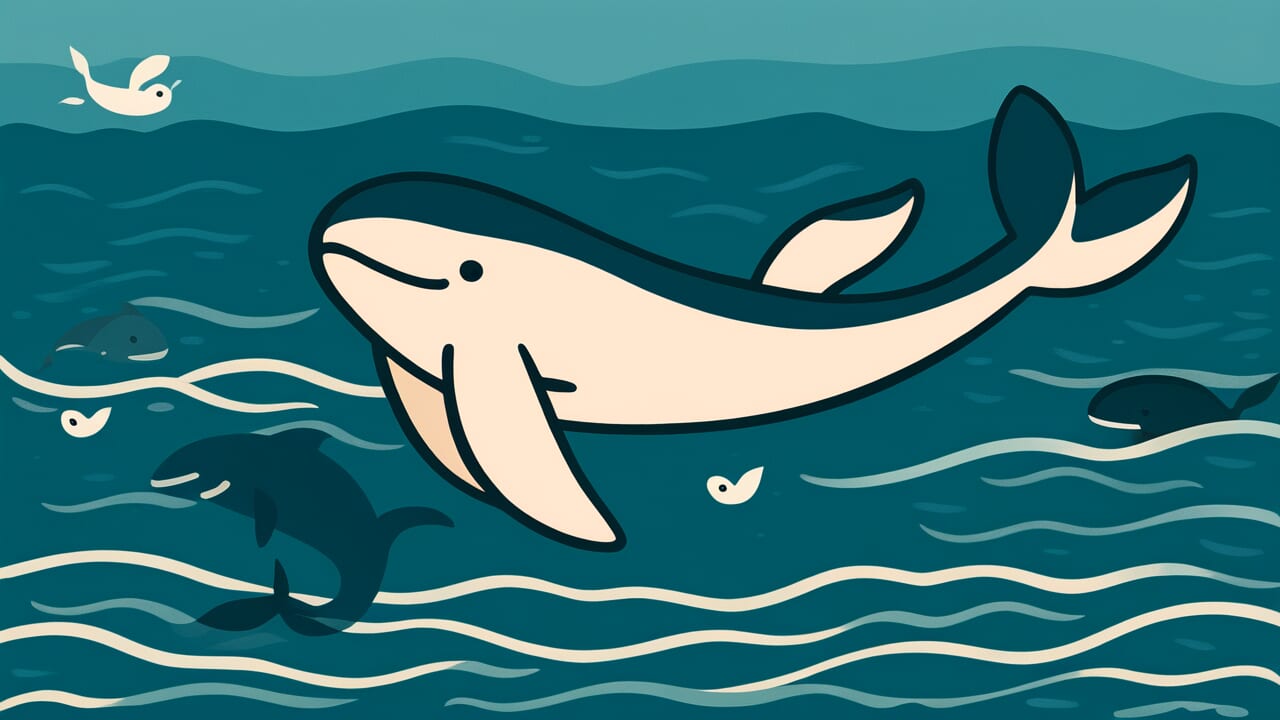How to Read “A whale is a fish, and a whitebait is a fish”
Kujira mo uo, shirauo mo uo
Meaning of “A whale is a fish, and a whitebait is a fish”
“A whale is a fish, and a whitebait is a fish” teaches that large and small beings are essentially the same kind. It speaks of equality that transcends differences in status and position.
The largest creature in the ocean, the whale, and the tiny whitebait that fits in your palm are both equally fish. This fact teaches us that in human society too, the powerful and the common people are essentially the same.
The rich and the poor share the same human nature. We use this proverb to warn against discriminating or looking down on people based on status, position, or wealth.
It also encourages those who feel small or insignificant. It reminds them, “You are also a valuable member.”
Even in modern society, we often judge people by job titles, income, or education. But this proverb reminds us to look beyond such surface differences. It calls us back to the fundamental equality we share as human beings.
Origin and Etymology
The exact literary origin of this proverb is unclear. However, the structure of the phrase offers interesting insights.
The contrast between whale and whitebait is remarkably clever. Whales are the largest creatures in the ocean, sometimes reaching 30 meters in length.
Whitebait, on the other hand, are tiny fish only a few centimeters long. By placing these two creatures of extreme size difference side by side, the proverb creates powerful visual impact.
What’s interesting is calling the whale a “fish.” Modern biology classifies whales as mammals. But in old Japan, people broadly called sea creatures “fish.”
This expression wasn’t based on scientific classification. It reflected how people experienced these creatures in daily life.
Some scholars suggest this proverb emerged against the backdrop of Edo period social hierarchy. Perhaps people used sea creatures to express equality among samurai, merchants, and farmers.
In an era when directly criticizing the class system was difficult, this natural metaphor offered wisdom. It spoke of essential equality without causing trouble.
Interesting Facts
During the Edo period, whitebait was a luxury food item. It was so prized that it was presented to the shogun’s family.
Despite being small, whitebait was treated as valuable. This fact strengthens the persuasive power of the proverb.
In Japan’s coastal whaling history, catching one whale could enrich an entire village. There’s a saying: “One whale enriches seven bays.” The economic value was enormous.
Usage Examples
- The company president and new employees alike—a whale is a fish, and a whitebait is a fish. Everyone is an important member supporting the organization.
- Whether you graduated from a famous university or finished high school, a whale is a fish, and a whitebait is a fish, right?
Universal Wisdom
Humans have always compared themselves to others. We rank people to feel secure. We feel admiration or envy toward those above us.
We feel superiority or relief toward those below. This mental pattern probably hasn’t changed since humans first formed societies.
Yet humans also possess the wisdom to realize “aren’t we essentially the same?” This proverb has been passed down through generations because it touches this universal truth.
What’s interesting is that the proverb doesn’t say “eliminate differences.” Whales are large, whitebait are small. The difference clearly exists.
But both are fish. In other words, acknowledge the differences while remembering you’re still the same kind. Don’t forget you belong together.
Human society naturally develops different roles. There are leaders and supporters. But different roles don’t mean different human value.
This obvious yet easily forgotten truth was conveyed by our ancestors. They used the familiar example of sea creatures to teach it.
In a human society where discrimination and prejudice never cease, this simple truth continues to resonate across time.
When AI Hears This
When the human brain hears the word “fish,” it pictures typical forms like tuna or sardines. Cognitive science calls this a “prototype.”
What’s interesting is that whales are biologically mammals. Yet many people feel they’re “fish-like.” Surface features trigger the brain’s “fish category” strongly.
Swimming in water, having fins, having a streamlined shape—these characteristics activate our mental fish category.
According to cognitive psychologist Eleanor Rosch’s research, humans prioritize “visual similarity” and “daily interaction” over scientific definitions when classifying things.
Our brains tend to create categories based on appearance and behavior patterns. We don’t focus on DNA or internal structure. This tendency existed because it aided survival.
In primitive times, seeing a large creature in water, it was more important to instantly judge “Can I eat it? Is it dangerous?” Classification as mammal or fish came second.
This proverb reveals the dual structure of human cognitive systems. In daily life, we use practical “appearance-based classification.” We switch to scientific classification only when necessary.
AI struggles to understand human common sense because these switching rules are context-dependent and ambiguous. Experts and laypeople talk past each other because they use different hierarchical levels for the same words.
Lessons for Today
Modern society is an era where more diverse people coexist than ever before. Nationality, culture, values, lifestyles—differences stand out in every aspect.
Sometimes these differences create conflict and division.
This proverb teaches us wisdom: acknowledge differences while focusing on commonalities. When interacting with colleagues of different ages or experience at work, remember this perspective.
When engaging with people of different backgrounds in your community, hold this thought: “But we’re all human.” Your attitude will naturally change.
What’s important is directing this perspective toward yourself too. If you feel inferior compared to someone right now, remember this.
A whale is a fish, and a whitebait is a fish. Size and visibility may differ, but you are certainly a valuable member of this society.
When you feel tempted to look down on someone, or when you want to belittle yourself, return to this simple truth. From there, warmer human relationships can begin.



Comments